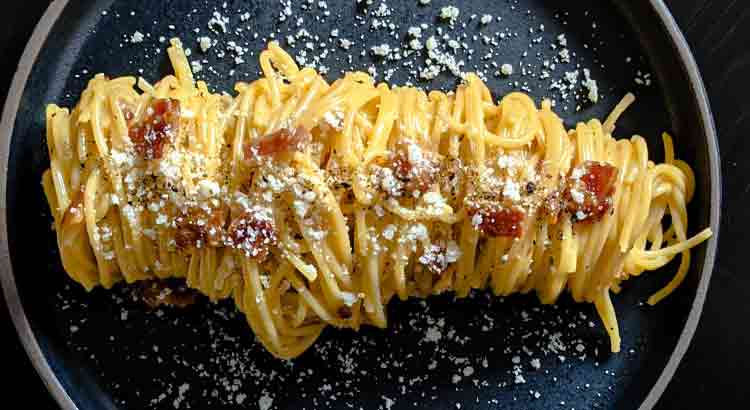We’ve all experienced that disappointing moment when our eagerly anticipated pasta dish turns out to be a bowl of mushy noodles. It’s a culinary letdown that can dampen our spirits. But fear not! In this article, we’re going to uncover the seven reasons why your pasta noodles might be ending up mushy and, more importantly, how to fix them. So, grab your apron and let’s dive right in to rescue your pasta from the dreaded mushiness!
The most common reason why your pasta noodles are mushy is overcrowding the pot. When the pot is overcrowded, the pasta can’t cook properly or evenly, and they will become mushy.
Cooking the perfect pasta involves a delicate balance of time, technique, and attention to detail. It’s not just about tossing noodles into boiling water and hoping for the best. So, let’s get ready to unravel the mysteries of mushy pasta and equip ourselves with the knowledge to create toothsome, satisfying meals.
Overcrowding the Pot
One of the main reasons your pasta noodles turn out mushy is because you’ve overcrowded the pot. I know, I know, it’s tempting to throw all those delicious strands into the pot at once, but trust me, it’s not doing your pasta any favors.
When you overcrowd the pot, the noodles don’t have enough space to move around freely. They end up clumping together, and the water temperature drops significantly. As a result, the noodles don’t cook evenly, and you’re left with that dreaded mushy texture. So, next time you’re cooking pasta, give those noodles some breathing room in the pot. Your taste buds will thank you!
Not Using Enough Water
Ah, the age-old debate: how much water do you really need to cook pasta? Well, my friend, using too little water is another common culprit behind those mushy pasta noodles. I get it, you want to save time and energy by using less water, but unfortunately, it comes at a cost.
When you don’t use enough water, the pasta releases starch, and that starch ends up getting concentrated in the cooking liquid. This excess starch causes the noodles to stick together and become overly soft and mushy. To avoid this culinary catastrophe, make sure to use a generous amount of water when cooking your pasta. The general rule of thumb is to use at least 4 quarts of water for every pound of pasta. So go ahead and give your noodles the spacious, watery environment they deserve!
Undercooking
One reason for undercooked pasta is simply not giving it enough time to cook properly. It’s understandable, though. Patience is not always our strongest suit when we’re hungry and craving a delicious pasta dish.
But here’s the thing: pasta needs time to absorb water and cook through. If you take it out too early, you’re left with noodles that are tough and chewy. So, resist the temptation to rush the cooking process. Follow the instructions on the pasta package, but remember that those cooking times are just guidelines. To achieve that perfect al dente texture, try tasting a strand of pasta a minute or two before the suggested cooking time is up. Trust your taste buds and adjust the cooking time accordingly. Your reward will be beautifully cooked noodles that are neither mushy nor underdone.
Using Old Pasta
Now, I know it can be tempting to use up those forgotten boxes of pasta lurking at the back of your pantry. After all, wasting food is never fun. But using old pasta that has been sitting around for ages can contribute to the dreaded mushy noodle syndrome. You see, pasta, like any other food, has a shelf life.
Over time, pasta can absorb moisture from the air, causing it to become stale and lose its firmness. When you cook old pasta, it can easily turn mushy because it has already absorbed too much moisture. So, before you embark on your pasta adventure, take a peek at the expiration date on the box. If your pasta is past its prime, it’s better to bid it farewell and grab a fresh box from the store. Your taste buds will thank you for it, and you’ll be one step closer to achieving pasta perfection.
Overcooking
Ah, the perils of overcooking pasta. It’s a tragedy that has befallen many home cooks, but fear not, my friends, for I am here to shed some light on this culinary conundrum. Overcooking pasta is a surefire way to end up with a bowl of noodles that are not only mushy but also lacking in flavor and texture.
When you leave your pasta in the boiling water for too long, the noodles become excessively soft and lose their structure. They start to break down, releasing more starch into the cooking liquid. This excess starch makes the noodles stick together and results in that unappetizing mushiness. So, keep a watchful eye on your pasta while it’s cooking. Test it for doneness by sampling a strand or two. You want your pasta to be tender with a slight bite, known as al dente. Once you achieve that perfect balance, quickly drain the pasta to halt the cooking process and prevent any further mushification. Your pasta dishes will be elevated to a whole new level of deliciousness.
Not Letting the Water Boil Before Adding the Pasta
Here’s a mistake that can easily slip under the radar: not waiting for the water to come to a rolling boil before adding your precious pasta. Trust me, I understand the impatience that comes with hunger, but this step is crucial to ensure your noodles turn out just right. Let me break it down for you.
When you add pasta to water that hasn’t reached a proper boiling point, it takes longer to cook. And the longer it stays in the water, the higher the chances of ending up with a mushy disaster. See, when the water is boiling, it keeps the noodles moving and separate. This helps them cook evenly and retain their desired texture. So, hold your horses and give the water a chance to reach that bubbling, boiling state before introducing your pasta. It may seem like a small detail, but it can make a world of difference in your pasta-cooking adventures.
Storing Pasta Incorrectly
It’s easy to overlook this aspect, but it plays a significant role in the quality of your cooked noodles. If you’ve been storing your pasta incorrectly, it can lead to moisture absorption, which ultimately leads to mushy results. Let me share some insights to help you avoid this culinary pitfall.
Firstly, keep your pasta in a cool, dry place. Exposure to moisture and humidity can make it go soft and lose its firmness. That means storing it away from the sink or any steam-producing appliances in your kitchen. Secondly, transfer your pasta into airtight containers or resealable bags once you’ve opened the original packaging. This prevents moisture from seeping in and affecting the texture. And finally, make sure to use up your pasta within a reasonable time frame. While dried pasta has a longer shelf life, it’s still best to consume it within a year or so for optimal quality. By storing your pasta correctly, you’ll have a better chance of ending up with perfectly cooked, non-mushy noodles every time you hit the kitchen.
Final Thoughts
And there you have it, we’ve explored the common mistakes that can turn your pasta noodles into a disappointing mushy mess. But fear not, for armed with these insights, you now have the knowledge to conquer the kitchen and create perfectly cooked pasta dishes that will leave your taste buds singing with joy.
Remember, give your noodles some space to swim freely in the pot, use an ample amount of water to prevent excess starch buildup, and cook them just until they reach that delightful al dente texture. Be patient, my friends, and resist the urge to rush the process. Additionally, pay attention to the quality of your pasta, ensuring it’s fresh and properly stored. And let’s not forget the importance of waiting for the water to reach a rolling boil before adding your pasta—it’s a small step that yields big results.
So, go forth and whip up some pasta masterpieces! Experiment with different sauces, toppings, and noodle varieties, knowing that you have the skills to cook them to perfection. With these tips in your arsenal, there’s no doubt that your pasta dishes will become the talk of the town. Happy cooking, and may your noodles always be gloriously firm and delicious!

